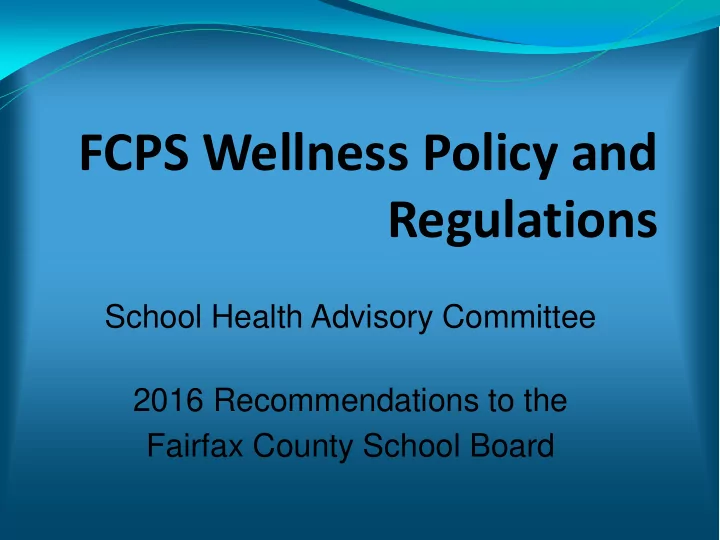

FCPS Wellness Policy and Regulations School Health Advisory Committee 2016 Recommendations to the Fairfax County School Board
Purpose Place the health and wellness of FCPS students and staff members at a level of importance no less than that which is accorded to academic achievement or anything upheld in the Board’s beliefs, mission, and vision . Compliance with Public Law 111-296 - Healthy, Hunger-Free Kids Act of 2010
Preamble
Comprehensive ● Physical Education ● Physical Activity ● Health Education ● Health Services ● Healthy and Safe School Environment ● Counseling, Psychological and Social Services ● Health Promotion for Staff ● Family and Community Involvement ● Food and Nutrition General ● Nutrition Education, Promotion, and Food Marketing ● Nutrition Guidelines
SHAC
Physical Education ● Provide knowledge, skills, and confidence to pursue health-enhancing goals of personal fitness. (P) ● Learn the relationship between physical activity, chronic-disease prevention, and positive health outcomes. (P) ● PE teachers will strive to engage students in moderate to vigorous activity at least 50% of time during PE classes. Schools will consider facilities and need for activity space when determining class size. (R)
Physical Activity ● Recess will be provided to all elementary students daily, for a minimum of 15 minutes, with a recommendation for 20 minutes. (R) ● Recess will be scheduled before lunch when possible. (R)
Schools are encouraged to incorporate physical activity in all subject areas. (R)
Health Education ● Develop lifelong healthy decision-making and healthy outcomes. (R) ● Stress management and coping skills, depression, suicide prevention and awareness, and other mental health issues, and the relationship of sleep hygiene to mental health. (P) ● Evidence-based benefits of healthy sleep will be incorporated into health education. (R)
Health Services ● Access or referral to primary health care and behavioral health care for all students. (P) ● Protocols will be established to guide staff members when a student discloses or exhibits concerning behaviors, such as harm to self or others. (P) ● Maintain awareness of various school health service delivery models, such as school-based health centers. (P) ● Regular access to public health nurses will be provided to students to address health, safety, and psychological issues specific to school settings. (P)
Healthy and Safe School Environment ● FCPS recognizes the health benefits and encourages parents to consider having their children walk and/or bike to and from school. This parental decision is not subject to review by the principal. (R) ● Safe, supportive, and culturally responsive school environments that foster teacher-student relationship, learning and student achievement (P) ● Maintain the most comprehensive tobacco-free policy allowed by law. (R) ● Strive to align school start times with best practices to positively affect student health, wellness, and learning (R)
Counseling, Psychological, and Social Services ● Foster social-emotional health and wellness of students and staff. (P) ● FCPS will support and value social and emotional well- being by providing an environment that encourages students and staff members to maintain a healthy balance between work, academics, family life, and recreation. (P) ● School-related factors contributing to unhealthy student stress, anxiety, and depression related to peer pressures, academic pressures, and expectations will be analyzed and used to inform policy designed to mitigate those factors. (P)
Health Promotion for Staff ● Work environment that promotes healthy living; providing opportunities for staff members to improve their health through physical activity, health-related training, health screenings, stress management, food and nutrition, personal growth, mindfulness, and health care access. (P) ● Each school and department will identify a staff wellness liaison to support the wellness policy. (R)
Family and Community Involvement ● FCPS will identify common barriers to family involvement in student and/or school-related health and wellness initiatives and will work to mitigate these barriers.(P) ● Individual school and division business and community partnerships that promote student and staff health and wellness shall be sought. (R)
“ We should want for every child what we want for our own child.” Rodney Taylor, Director, FCPS Food and Nutrition Services
Food and Nutrition General ● Students who participate in the school meal programs will have equal access, in all schools and centers, to the same high quality food and nutrition. (P) ● Overt identification of students who are eligible for free and reduced-priced school meals will be prohibited. (P) ● Students will have at least 10 minutes to eat after sitting down for breakfast and 20 minutes to eat after sitting down for lunch. (R) ● Schools are encouraged to use non-food items for classroom celebrations.
Nutrition Education, Promotion, and Food Marketing ● Schools are responsible for presenting students with the best possible learning opportunities, not only in the classroom, but also throughout the school environment, including the cafeteria. (P) ● Only foods and beverages that meet the “Smart Snacks in School” nutrition standards will be marketed and advertised on school grounds during the school day. (R) ● The nutritional content and ingredients of all foods and beverages offered by FNS to students during the school day will be shared with students and parents. (R)
Nutrition Guidelines ● FNS will continually strive to reduce its measure of highly processed foods offered to students before, during, and after the school day; while increasing the availability of whole, minimally processed, nutrient-rich foods in forms as close to their natural state. (P) ● Sodas and sports drinks will not be offered for sale to students at any time during the school day. (R) ● All foods and beverages sold as part of official reimbursable school meal programs will meet or exceed the minimum nutrition requirements set forth for these programs by federal regulations. (R)
Implementation, Monitoring, Accountability, and Community Engagement ● SHAC will assess and review the FCPS Wellness Policy and Regulations to make recommendations to the School Board and serve as a vehicle for engaging the public.
Recommend
More recommend